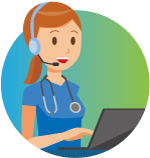Spring Break During COVID-19

How to Stay Safe Without Sacrificing Fun
Planning to travel somewhere for spring break? With COVID-19 cases and hospitalizations trending downward statewide, it’s tempting to let your guard down and take a break from it all, including COVID-19 safeguards. But vacationing somewhere new can still increase your chance of spreading and getting sick – so if you do choose to travel, you'll want to take these extra precautions.
Before You Leave
Get YOUR COVID-19 Vaccine or Booster

Get Tested
Thanks to at-home rapid antigen tests – now available for free – you can easily determine whether you're positive for COVID-19 within just 30 minutes. Be sure to take this self-test immediately before traveling, even if you don't feel ill. "This helps ensure you aren't an asymptomatic carrier or early on in the illness,” says Christine Nefcy, MD, FAAP, Munson Healthcare's Chief Medical Officer.
If you do test positive, or you've been exposed to COVID-19 or have symptoms, make immediate arrangements to postpone your trip until you're feeling better and/or you’re no longer positive. Traveling during a time when you could become severely ill and even require hospitalization is never a good idea. And even if you don’t experience symptoms, you still risk spreading COVID-19 to others.
Pack COVID-19 Supplies
It's easier to lose or misplace things when we're out of our element and normal routines. For this reason, add extra masks/respirators and hand sanitizer to your packing list so you have plenty of COVID-19 protection if and when you need it. Consider dividing these supplies evenly among your luggage so if you lose a suitcase, you still have access to clean masks and a go-to hand cleansing option. Remember to choose hand sanitizer with 60 percent or more alcohol.
Masks are still generally required for public transportation – we encourage you to wear one regardless of the level of enforcement. Any mask will offer you and others some level of protection, though a K95 respirator offers the maximum level of protection by filtering about 95% of the air you breathe. Don't forget the importance of handwashing – and if you can't access soap and water at the moment, rubbing hand sanitizer thoroughly over your hands until dry will do the trick.
On Vacation
Maintain Separate Vacation Households
Vacationing with family or loved ones outside your immediate household who haven’t yet been vaccinated? Stay in separate hotel rooms or rentals to reduce your chances of spreading COVID-19 to each other. Take your mutual activities and meals outdoors as much as possible so you can socially distance while still enjoying each other's company. If you do spend time together indoors, wear a mask if you can’t socially distance at least six feet apart or more (approximately two arms' length).
Avoid Crowded Areas

This is an ideal time to rethink your family's vacation mindset. If you tend to turn your vacation into an activity-filled marathon so you can experience all the popular destinations, focus more on relaxation and quality time. Consider having a family meeting about the importance of just spending time together – and staying safe.
Plan activities that keep you safely distanced from others, such as:
- Seeking less popular beaches (or a more remote part of the beach)
- Lawn games like badminton, catch, or bean bag toss
- Bike riding, kayaking, or golf
- Home-based meals (think carryout or cooking your own meals with fresh local produce and flavors)
- If shopping is a must, avoid stores that don't require masks – or master the art of window browsing.
Remember Your Mask Indoors
Depending on where you’re traveling and the level of risk, masking still protects you from becoming infected and/or spreading COVID-19 to others. If you’re traveling to a higher-risk area or you’re more at risk for severe illness, masking in indoor public spaces is still strongly recommended – so be sure to research your vacation spot in advance to understand the COVID-19 community level. Remember to swap out disposable masks after each use and to avoid wet or dirty masks and respirators of any kind.
Back Home
Monitor and Retest

Regardless of your vaccination status, all returning travelers should monitor their symptoms in the days following vacation and get tested if any symptoms arise.
Which COVID-19 Test is Best?
Need to test due to traveling or COVID-like symptoms? Find the test that suits you best, learn the difference between a PCR and rapid-antigen test, and get the latest quarantine recommendations based on your travel, symptoms, and vaccination status.

Questions? Ask-A-Nurse!
